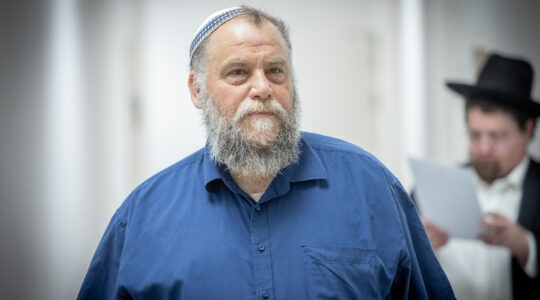WASHINGTON (JTA) — After six years as agriculture secretary and five years as chairman and CEO of the Motion Picture Association of America, Dan Glickman knows something that might surprise some people: You can find plenty of Jews in both industries.
“Historically there were not a lot of Jewish farmers in this country,” primarily because so many Jews in Europe were not permitted to own land, Glickman said during a recent interview with JTA. But, he points out, many Jewish Americans are involved in other aspects of the agriculture ndustry, from meatpacking to processed foods.
Meanwhile, in Hollywood, the original movie moguls indeed were mostly Jewish, and Jews continue to fill the ranks of the creative side of the business. But these days, Glickman says, most “movie companies are subsidiaries” of larger corporations and “tend to be not Jewish-controlled at all.”
He adds that the the bulk of the movie industry — from the truck drivers to the caterers to the camera operators — is really no more Jewish than any other business.
Still, as Glickman likes to joke, where else but America would you find a Jewish secretary of agriculture promoting the pork industry?
Glickman, also a U.S. Congress member from Kansas for 18 years, made the quip earlier this month at a dinner in Washington, where he accepted the Hubert H. Humphrey Award from the National Jewish Democratic Council.
Being Jewish wasn’t a problem in any of his jobs, he says, but his Democratic Party background didn’t help when he took over in 2004 at the Motion Picture Association of America, which among other things runs the movie ratings system.
“When I came into the job, Republicans controlled both houses of Congress and the presidency,” he recalled. “It was an uphill battle.”
But his experience as agriculture secretary, which Glickman calls “the most nonpartisan department,” and his willingness to do some things he’d never done — like attend fund-raisers for Republican candidates — enabled him to build relationships with the GOP, he said.
Glickman says he occasionally sees attacks on Hollywood that meld “liberal” and “Jewish” together, and that though Hollywood is often attacked as liberal, it’s really a misnomer except for the most visible actors and filmmakers.
There are “more and more conservative Jewish people in the business,” he said.
“Ninety-nine percent of Hollywood is not out defending Roman Polanski,” said Glickman, who works in Washington. “They’re normal people who do their job, work hard and want to help their families as best they can.”
Much of Glickman’s job has nothing to do with the creative side of the movie business. He deals with economic and business matters, particularly intellectual property issues such as “protecting our content from being stolen.”
Glickman gained experience on the issue and others during his tenure in Congress, where he was one of three Jewish representatives or senators who were born in Wichita, Kan.
According to Glickman, his grandfather and the father of Sen. Arlen Specter (D-Pa.) were in the oil-field supply business together, and their families were close friends. Meanwhile, Glickman and Sen. Ron Wyden (D-Ore.) were born in the same Wichita hospital.
The 64-year-old Glickman, 64, recalls that the 1,000-member Jewish community in Wichita during his childhood provided him with “a good Jewish education” and says his Jewish heritage “goes long and deep.”
His Judaism, he says, gives him “a value system of treating people well” and leads him to try to “follow the golden rule.”
While Glickman says he’s not much of a synagogue goer other than on the High Holidays, he has struck up a relationship with Rabbi Levi Shemtov, Washington director of the American Friends of Lubavitch.
Shemtov, who has connections on both sides of the aisle, recalls when Glickman was scheduled to light the national Chanukah menorah on the Ellipse on an afternoon of pouring rain. The rabbi worried that the then-agriculture secretary wouldn’t show, but his motorcade pulled up and Glickman battled the elements to do the job.
“Everyone likes Dan Glickman,” said Shemtov, “and that’s very rare in Washington.”
Glickman says he’s not a member of Lubavitch, but likes Shemtov’s “very modern view of problems people have.”
As to his future, Glickman doesn’t know how long he’ll be at the motion picture association, but says with confidence that it won’t approach the 38-year tenure of his legendary predecessor, Jack Valenti.
Glickman is active in the fight against hunger, serving as a board member of Mazon: A Jewish Response to Hunger.
“Ultimately at heart I’m a non-profit, public service guy,” he said.
“I don’t miss raising money,” Glickman said about being a congressman, but “I do miss the impact on lives.”





